Labour policy debated at special FW Question Time
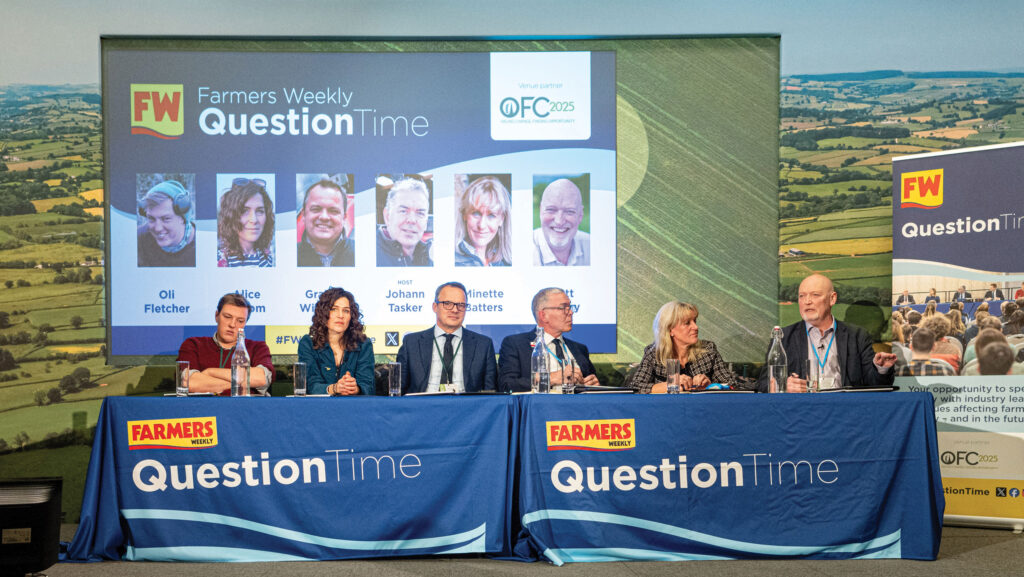 © Telling Photography
© Telling Photography How farmers should respond to political challenges was a key focus for the latest Farmers Weekly Question Time event, hosted by Johann Tasker at the Oxford Farming Conference.
Topics discussed included the current inheritance tax issue, funding, the drive to net zero and adopting technology.
The expert panel included Minette Batters, former NFU president, and farmer and agricultural historian Oli Fletcher, from the Farming Explained YouTube channel.
See also: Farmers Weekly Podcast Ep 236: Defra’s big plan for farming
Expert panel
Oli Fletcher, dairy farmer’s son, Leicestershire
Having studied history at Oxford, Oli is working to improve public awareness of rural issues and farming’s intimate relationship with the environmental movement through his YouTube channel Farming Explained.
Alice Groom, head of sustainable land policy at RSPB
Alice leads the RSPB’s work to secure policies that put nature at the heart of how we farm and manage land and water, enabling us to tackle the nature and climate crisis, while meeting the needs of current and future generations.
Graham Wilkinson, chief executive of AHDB
Graham has a deep understanding of best-practice production.
He has gained considerable practical knowledge from his time working on his family farm as well as for Tesco and Arla Foods.
Minette Batters, former NFU president
Minette has represented the interests of more than 46,000 farming businesses across England and Wales through unprecedented times, navigating the challenges of Brexit, Covid 19 and the war in Ukraine.
Matt Lobley, professor of rural resource management, University of Exeter
Matt is a rural social scientist, with more than 30 years of research experience.
His work largely focuses on understanding the influences on, and impacts of, farm household behaviour.
Inheritance tax
Has the government broken the covenant with farmers?
Former NFU president Minette Batters insisted the relationship was already broken.
“I think farmers feel this [inheritance tax] is the straw that broke the camel’s back.
“We’ve been through enormous change – leaving the EU, a global pandemic, triple-digit inflation on the back of the war in Ukraine, trade deals with negative impact and then this.
“Those that are advising the government are incredibly out of touch with the rural economy and how it underpins so much of the fabric of life and the whole economic machinery.”
Baroness Batters was clear that the task ahead was enormous and required strong leadership.
“I hope [Defra secretary] Steve Reed will show leadership in putting things back together again, because we can’t afford to carry on. We will see real-time consequences if things don’t change.”
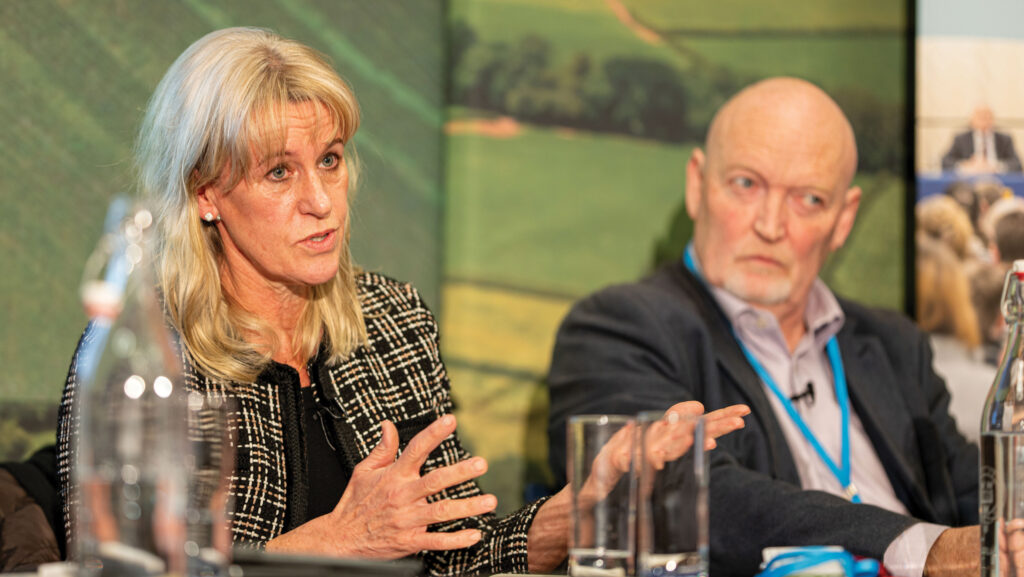
Minette Batters © Telling Photography
Leicestershire farmer, rural historian and host of the Farming Explained YouTube channel, Oli Fletcher, didn’t feel the government was representing the people and called for the Defra minister to step down.
“We are the people, and parliament is supposed to represent the people,” he said.
“We haven’t had a minister who’s been competent to oversee this sector possibly for decades.
“He has demonstrated disdain for the people in this industry and has no understanding of our motivations, how we live and the things that are important to us.
“If this government has any chance of healing the wounds it has created, he must resign.”
Taxpayer support
As the government tightens the purse strings, is it time for UK agriculture to become more business focused rather than taxpayer supported?
AHDB chief executive Graham Wilkinson said that, while there was likely to be less financial support for food and farming in future, the industry already had a business attitude.
“I’ve yet to meet a farmer who isn’t business focused,” he said.
“Farmers are looking to embrace change, looking at opportunities and the first wins.
“What’s really key is that we as an industry support all farmers in improving what they’re able to do on their own farms.”
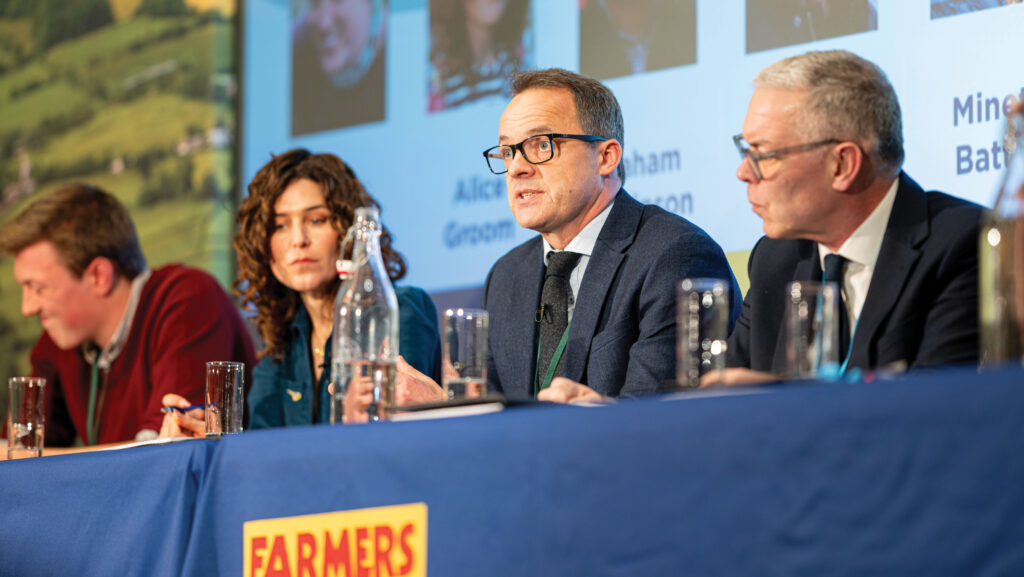
Graham Wilkinson © Telling Photography
Alice Groom, head of sustainable land policy at RSPB, felt government and the private sector needed to come together for a common goal.
“There’s a strong business case for both government and private business to invest in nature-friendly agriculture, to tackle the nature and climate crises.
“We’re facing a time where government is tightening the purse strings, but there’s a need to push back, to fight for more investment.”
Baroness Batters didn’t feel the industry was getting the support it deserved.
“Pigs, poultrymeat, eggs, horticulture are completely unsupported, and we put them under the same banner as broad-acre and livestock.
“Those are sectors that we have continued to legislate and regulate to ever higher standards.”
Despite the regulation, she said the sectors were subjected to imports that are not produced to those same standards.
“The fundamental role of any government is to make sure that those farmers are getting a fair return for what they’re producing,” she said.
“That, without doubt, needs reform of the Groceries Code Adjudicator and the framework, but also regulation – and that comes at a price.”
With farmers and producers carrying all the cost and risk against a backdrop of challenging weather patterns, Baroness Batters said it was only fair that taxpayers pick up some of the bill.
“If they want affordable food, and they have the most affordable food in Europe, then I think they receive a fantastic return on the taxpayer investment.”
Matt Lobley, professor of Rural Resource Management at the University of Exeter, argued that, while the industry has plenty of entrepreneurial spirit, in the absence of private sector funding, government funding was essential in keeping farmers on the land.
“I have no problem in supporting farmers to produce all the things that we want them to produce, that the market doesn’t pay them for.
“Some people might put some capital payments in, but farmers need something to replace the BPS. If we look at the private sector to solve all the problems – that’s not going to be the solution.”
Audience comment:
Ali Capper, Oxford Farming Conference director and farmer, said: “We send young people to agricultural college to learn about farming and we teach them about diversification.
“Who would expect a doctor to go and learn about medicine and on the side learn about being an electrician, just in case the medical bit doesn’t work out?
“The idea that we’re not entrepreneurial enough and businesslike – I find quite offensive.”
Direct action
How direct should direct action get?
Given the strong feeling in the industry about government policy, Mr Fletcher was supportive of direct action.
“At the moment, we’re experiencing farmers finding a voice. We’ve had actual real working farmers going to London and speaking for themselves. I think it has been successful.”
Despite polling suggesting that the public is on farming’s side, he was cautious about the situation developing into a culture war.
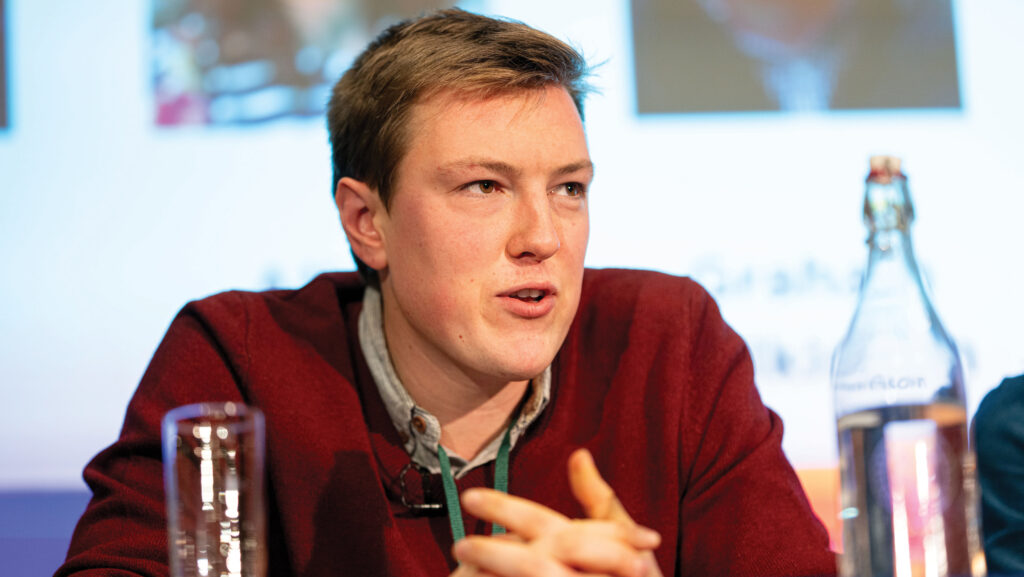
Oli Fletcher © Telling Photography
“What we’ve done so far has worked because it has been positive. We can’t mess that up by irritating the wrong people. We must share our culture in a positive way.
“People are interested in the countryside. They’re interested in the tales of pastoral England, the history of the landscapes that is intertwined with all of our family history.
“I think we must focus on those things, keep it positive, keep winning the argument and eventually the government is going to have to give.”
The NFU has always trodden a fine line when it comes to direct action, said Baroness Batters.
“The trick is to stay at the table and not get locked out of the room. The moment you’re locked out of the room, then you can’t influence anything at all.
“It’s been wonderful to see the industry come together, the unity on the streets of London, people who have probably never got involved before making their point.
“But we are also on a tightrope now.”
Compromise and discussions were the way forward, she stressed.
“[NFU president] Tom Bradshaw is saying we want the government to pause and consult with the industry and find a way forward.
“The Treasury, who are not engaged with the rural economy, have wanted to do this [introduce IHT on farmland] for a very long time.
“Had they understood Defra’s own figures, this would not have happened.
“It’s a massive hospital pass for Steve Reed. The only thing he can do, and the only place it can come from now is the prime minister.”
Responding to how to keep the public on side, with talk of go-slows on the North Circular and blockading motorways, Mr Fletcher added: “We’ve done lots of positive campaigning.
“It’s about stepping things up. We will have to wait and see what is announced and action will be taken accordingly.”
Audience comment: Freelance journalist Anna Jones said: “Coming together, digging into the detail and coming to some kind of compromise – that’s the grown-up thing to hope for.”
Net zero
Should we keep farming’s net zero by 2040 goal?
With the industry up in arms, the work on reducing emissions and striving for net zero continues.
AHDB’s Mr Wilkinson said the industry had to look beyond a target, with sustainability being the key to success.
“We have some fantastic credentials that we should be extremely proud of.
“What concerns me is enabling farmers to work with the correct baselines on their farms so that they can then implement the changes specific to their farms.”
Reflecting on flooding incidents, Ms Groom said: “Climate change is here, and farmers are the most impacted.
“It’s important to keep that 2040 target and it’s something society can buy into, but it’s something farmers need support with – both in terms of the price they get for their food so they can invest in their business, and the need for investment in climate action and nature action on farms.”
Baroness Batters, who was the NFU president when the 2040 target was set, explained why she felt it should remain.
“At the time, there was talk of lowering the red meat sector by 30% and Michael Gove wanted to get all the major retailers to commit over the next decade to selling less meat.
“There was also growing legislation that was all at the expense of food production. We were facing an absolute tsunami of taxation that was going to restrict production.
“The moment we set the 2040 target, everybody flung their doors open asking how we would do it.
“That allowed us, through our commodity boards, to set up farmers across different commodities, across different land areas to work together to see what these policies could look like and benchmark it against the scientific and academic community to create the right policies to deliver all of this.
“The massive worry right now, an even bigger worry than IHT, is the carbon border adjustment mechanism whereby the Treasury is focused on a production tax.
“On fertiliser, you will be looking at big taxes. They’re not looking at consumption. We must develop a policy for delivering more food in a decarbonised world.”
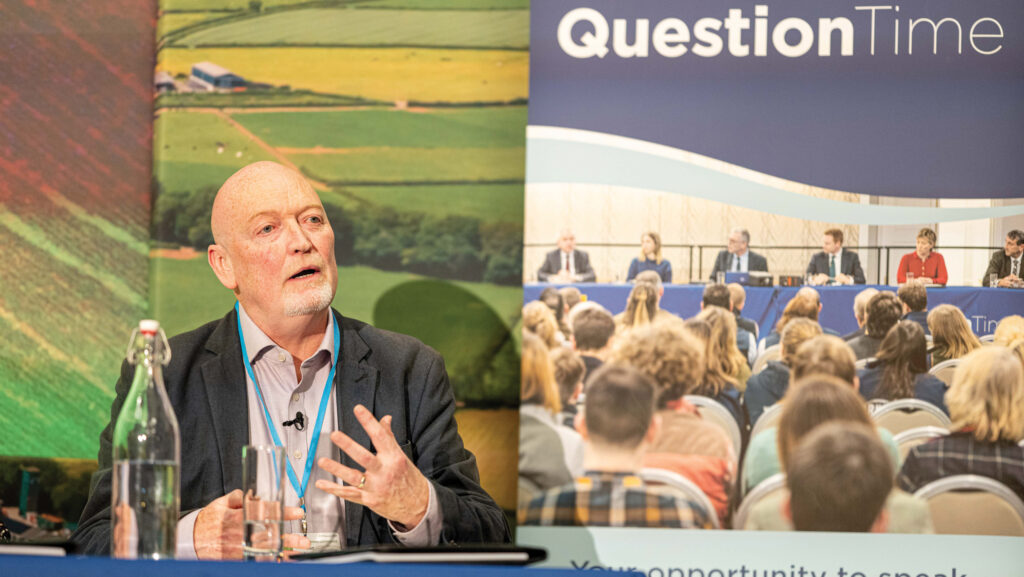
Matt Lobley © Telling Photography
Prof Lobley agreed that the target wasn’t just a nice to have. “This is something that’s essential and goes with all the other targets across the economy.”
Audience comment:
“Farmers are part of the solution, not part of the problem. We’re the only industry that can sequester carbon and there’s a lot that can be done there.
“To abandon that target would be stabbing ourselves in the back.”
Ms Jones added: “The net-zero target is something that farming can hold up as its progressive medal. You need that kind of positive optic in the world we live in, which makes everything political and tribal.”
Technology
Is the industry doing enough to encourage the adoption of new technologies on-farm?
Climate adaptation, technology and innovation all have a role to play in terms of reaching net zero, and Mr Wilkinson suggested more needs to be done.
“If you look at some of the work around genetics, there is clear advancement.
“If we are going to achieve and mitigate, be the solution to the challenges, then we need to move quicker and adopt faster.
“That requires support from the industry, from government and from farmers as well.
“For us to support our levypayers in the right way, we need to be part of that as well and that means we need to change and adapt, as does government and as does Defra.”
Ms Groom added that it was important to “look at a suite of measures that can be used but, as well as new technology, also think about the way nature can help farming”.
Change
What opportunities have you found when facing change?
Recognising that we must adapt, Prof Lobley said it was essential to embrace change if humans and society were to be resilient and move forward.
Baroness Batters agreed and added that farming has embraced change for millennia.
“It has evolved, it has changed, it has responded to challenges. It hasn’t always gone there willingly. But I feel confident for the young people coming into the industry.
“We have to produce double the amount of food by 2050 with half the energy and half the water. There are a lot of opportunities on the back of that.”
Mr Fletcher concluded: “Change is quite scary.
“But I think the beauty in it is that there are people from all these different places, all of these different farming types, practices and political backgrounds.
“There is change, but I feel that it is a shared change and any struggle that comes with it is a shared struggle. We’ve already proven that that can bring us together.”
Next event
To apply to be in the audience of our next Question Time, to be held at Plumpton College in East Sussex on Thursday 20 February, go to fwi.co.uk/questiontime
